英文阅读–傲慢与偏见
傲慢与偏见原著英语版

傲慢与偏见原著英语版Pride and Prejudice - The Classic English Version by Jane AustenIntroduction:Pride and Prejudice, written by Jane Austen, is a timeless classic that explores the themes of love, social class, and marriage in 19th century England. Known for its wit, engaging characters, and astute social observations, this novel has captivated readers around the world for over two centuries.Outline:I. Background informationA. Jane Austen's life and influencesB. Romantic and Victorian era contextII. Plot summaryA. The Bennet family1. Mr. Bennet and Mrs. Bennet2. Their five daughters: Jane, Elizabeth, Mary, Catherine (Kitty), and LydiaB. Introduction to Mr. Bingley and his partyC. Elizabeth's first impressions of Mr. DarcyD. The budding romance between Jane and Mr. BingleyE. Misunderstandings and misconceptions between Elizabeth and Mr. DarcyF. The elopement scandal of Lydia and Mr. WickhamG. Darcy's intervention and the subsequent reconciliationH. The happily-ever-after: Elizabeth and Darcy's eventual marriageIII. Themes and motifsA. Social class and its impact on relationshipsB. The role of women in societyC. Love, marriage, and personal growthD. The nature of pride and prejudiceIV. Character analysisA. Elizabeth Bennet: an independent and intelligent young womanB. Fitzwilliam Darcy: a complex and misunderstood characterC. Jane Bennet: the embodiment of gentleness and kindnessD. Mrs. Bennet: a comedic figure obsessed with marryingoff her daughtersE. Mr. Bennet: a man of dry wit and sarcasmF. Other key characters: Mr. Bingley, Mr. Wickham, Lady Catherine de BourghV. Austen's writing style and social commentaryA. Satire and irony as narrative devicesB. Austen's critique of the societal expectations placed on womenC. The portrayal of class-consciousness and the pursuit of economic stabilityVI. Legacy and impact of Pride and PrejudiceA. The enduring popularity of the novelB. Adaptations and retellings in various forms of mediaC. Contributions to the literary canon and feminist literatureConclusion:Pride and Prejudice remains a beloved literary masterpiecethat continues to resonate with readers of all ages. Through its delightful characters, engaging plot, and insightfulsocial commentary, Jane Austen's novel provides a window into the complexities of human relationships and the social dynamics of a bygone era. It is a testament to Austen'stalent and vision that Pride and Prejudice continues to be celebrated as one of the greatest works of English literature.。
傲慢与偏见 第一章英文原文
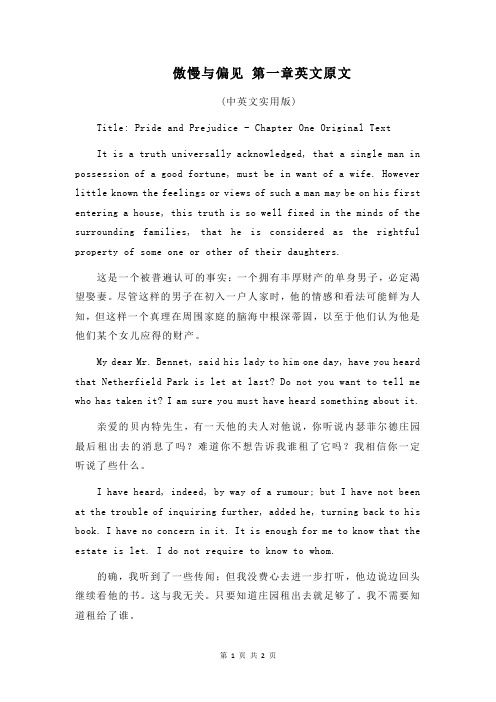
傲慢与偏见第一章英文原文(中英文实用版)Title: Pride and Prejudice - Chapter One Original TextIt is a truth universally acknowledged, that a single man in possession of a good fortune, must be in want of a wife. However little known the feelings or views of such a man may be on his first entering a house, this truth is so well fixed in the minds of the surrounding families, that he is considered as the rightful property of some one or other of their daughters.这是一个被普遍认可的事实:一个拥有丰厚财产的单身男子,必定渴望娶妻。
尽管这样的男子在初入一户人家时,他的情感和看法可能鲜为人知,但这样一个真理在周围家庭的脑海中根深蒂固,以至于他们认为他是他们某个女儿应得的财产。
My dear Mr. Bennet, said his lady to him one day, have you heard that Netherfield Park is let at last? Do not you want to tell me who has taken it? I am sure you must have heard something about it.亲爱的贝内特先生,有一天他的夫人对他说,你听说内瑟菲尔德庄园最后租出去的消息了吗?难道你不想告诉我谁租了它吗?我相信你一定听说了些什么。
傲慢与偏见英文简介3篇
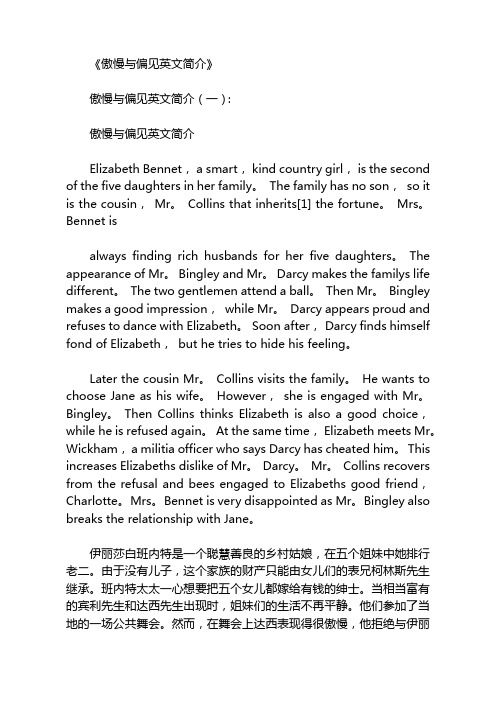
《傲慢与偏见英文简介》傲慢与偏见英文简介(一):傲慢与偏见英文简介Elizabeth Bennet,a smart,kind country girl,is the second of the five daughters in her family。
The family has no son,so it is the cousin,Mr。
Collins that inherits[1] the fortune。
Mrs。
Bennet isalways finding rich husbands for her five daughters。
The appearance of Mr。
Bingley and Mr。
Darcy makes the familys life different。
The two gentlemen attend a ball。
Then Mr。
Bingley makes a good impression,while Mr。
Darcy appears proud and refuses to dance with Elizabeth。
Soon after,Darcy finds himself fond of Elizabeth,but he tries to hide his feeling。
Later the cousin Mr。
Collins visits the family。
He wants to choose Jane as his wife。
However,she is engaged with Mr。
Bingley。
Then Collins thinks Elizabeth is also a good choice,while he is refused again。
At the same time,Elizabeth meets Mr。
Wickham,a militia officer who says Darcy has cheated him。
傲慢与偏见阅读报告英文版

Part 4
Part 4: Language and
Style
Part 4: Language and Style
Pride and Prejudice is written in a refined and elegant style, with Jane Austen's characteristic wit and humour. The language used is very formal and polite, reflecting the social norms of the time period. Austen uses irony, sarcasm and satire to criticize social norms and show the foolishness of prejudice and pride
Part 2
Part 2: The Plot
Part 2: The Plot
The plot of Pride and Prejudice is very intricate, with many characters and subplots. The story starts with Elizabeth Bennet, the protagonist, visiting her aunt and uncle in Meryton. Here, she meet
Darcy is the wealthy landowner who is proud and reserved, but deep down is kind and considerate. Jane Bennet is Elizabeth's sister who is gentle and demure, while Mr. Bingley is a wealthy young man who is easy-going and sociable
傲慢与偏见(英文版)

Jane Austen (1775-1817) (1775English writer, who first gave the novel its modern character through the treatment of everyday life. Although Austen was widely read in her lifetime, she published her works anonymously. The most urgent preoccupation of her bright, young heroines is courtship and finally marriage. Austen herself never married. Her bestknown books include PRIDE AND PREJUDICE (1813) and EMMA (1816). Virginia Woolf called Austen "the most perfect artist among women."
傲慢与偏见英文作文大学
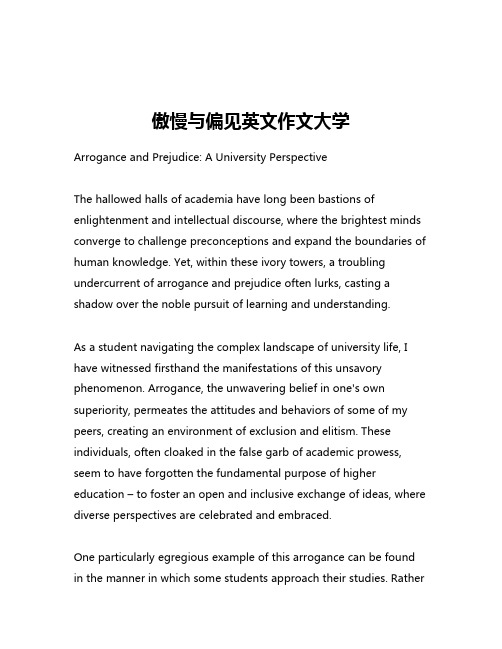
傲慢与偏见英文作文大学Arrogance and Prejudice: A University PerspectiveThe hallowed halls of academia have long been bastions of enlightenment and intellectual discourse, where the brightest minds converge to challenge preconceptions and expand the boundaries of human knowledge. Yet, within these ivory towers, a troubling undercurrent of arrogance and prejudice often lurks, casting a shadow over the noble pursuit of learning and understanding.As a student navigating the complex landscape of university life, I have witnessed firsthand the manifestations of this unsavory phenomenon. Arrogance, the unwavering belief in one's own superiority, permeates the attitudes and behaviors of some of my peers, creating an environment of exclusion and elitism. These individuals, often cloaked in the false garb of academic prowess, seem to have forgotten the fundamental purpose of higher education – to foster an open and inclusive exchange of ideas, where diverse perspectives are celebrated and embraced.One particularly egregious example of this arrogance can be found in the manner in which some students approach their studies. Ratherthan viewing their education as a collaborative journey of discovery, they treat it as a competition, a race to outshine their classmates and secure the coveted accolades and achievements that will bolster their perceived status. These students, blinded by their own inflated self-worth, often dismiss the contributions and insights of their peers, dismissing them as inferior or unworthy of consideration.This toxic attitude is not confined to the classroom, but extends into the broader social fabric of university life. Cliques and social hierarchies form, with the self-proclaimed "elite" students segregating themselves from the perceived "lesser" individuals. These exclusionary practices, rooted in prejudice and a sense of entitlement, erect invisible barriers that stifle the free exchange of ideas and the formation of meaningful connections between students.The consequences of this arrogance and prejudice are far-reaching, not only for the individuals directly affected, but for the university community as a whole. By fostering an environment of elitism and exclusion, we risk stifling the very innovation and creativity that universities are meant to cultivate. When diverse perspectives are marginalized, and intellectual discourse is stifled by the weight of arrogance, the university loses its ability to truly fulfill its role as a bastion of enlightenment and progress.Moreover, the perpetuation of such attitudes within the university setting has the potential to shape the future leaders and decision-makers of our society. If left unchecked, the arrogance and prejudice that permeate the ivory towers can become ingrained in the mindsets of the next generation, propagating these harmful behaviors into the broader societal landscape.It is incumbent upon us, as members of the university community, to confront this issue head-on. We must challenge the notion that academic prowess is synonymous with moral or social superiority, and work to cultivate an environment of mutual respect, empathy, and intellectual humility. By embracing diversity, encouraging collaborative learning, and fostering a culture of open-mindedness, we can transform the university experience into a truly transformative and enriching journey for all.This is not a simple task, as the roots of arrogance and prejudice run deep within the fabric of academia. It will require a concerted effort from students, faculty, and administrative leaders to implement meaningful change. Yet, if we remain steadfast in our commitment to the core values of higher education – critical thinking, empathy, and the pursuit of knowledge – we can overcome these challenges and create a university experience that truly fulfills its promise of enlightenment and progress.In conclusion, the prevalence of arrogance and prejudice within the university setting is a troubling phenomenon that must be addressed with urgency and resolve. By confronting these issues head-on and working to cultivate a more inclusive and intellectually humble environment, we can unlock the true potential of the university experience, and prepare the next generation of leaders and thinkers to tackle the complex challenges that lie ahead.。
英文阅读–傲慢与偏见

thankful
感激的
apparent
seeming
表面的;外觀的
satisfied
content:a satisfied look
感到滿意的;令人滿意的;滿足的
concentrating
to bring or draw to a common center or point of union
贊同的
Tempt(v.)
to make someone want to have or do something, especially something that is unnecessary or wrong
吸引
Interrupt(v.)
to stop a person from speaking for a short period by something you say or do, or to stop something from happening for a short period
攻克
Pale(adj.)
describes someone's face or skin if it has less colour than usual
蒼白的
Struggle(v.)
to experience difficulty and make a very great effort in order to do something
假裝
Disguise(v.)
to give a new appearance to a person or thing, especially in order to hide its true form
傲慢与偏见阅读心得英文范文(精选7篇)
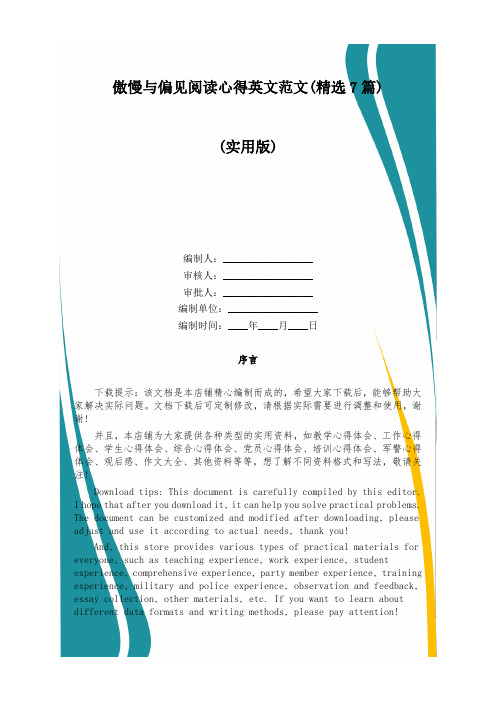
傲慢与偏见阅读心得英文范文(精选7篇)(实用版)编制人:__________________审核人:__________________审批人:__________________编制单位:__________________编制时间:____年____月____日序言下载提示:该文档是本店铺精心编制而成的,希望大家下载后,能够帮助大家解决实际问题。
文档下载后可定制修改,请根据实际需要进行调整和使用,谢谢!并且,本店铺为大家提供各种类型的实用资料,如教学心得体会、工作心得体会、学生心得体会、综合心得体会、党员心得体会、培训心得体会、军警心得体会、观后感、作文大全、其他资料等等,想了解不同资料格式和写法,敬请关注!Download tips: This document is carefully compiled by this editor.I hope that after you download it, it can help you solve practical problems. The document can be customized and modified after downloading, please adjust and use it according to actual needs, thank you!And, this store provides various types of practical materials for everyone, such as teaching experience, work experience, student experience, comprehensive experience, party member experience, training experience, military and police experience, observation and feedback, essay collection, other materials, etc. If you want to learn about different data formats and writing methods, please pay attention!傲慢与偏见阅读心得英文范文(精选7篇) 【导语】傲慢与偏见阅读心得英文范文怎么写好?本文精选了7篇优秀的傲慢与偏见心得体会范文范文,都是标准的书写参考模板。
傲慢与偏见英文原版
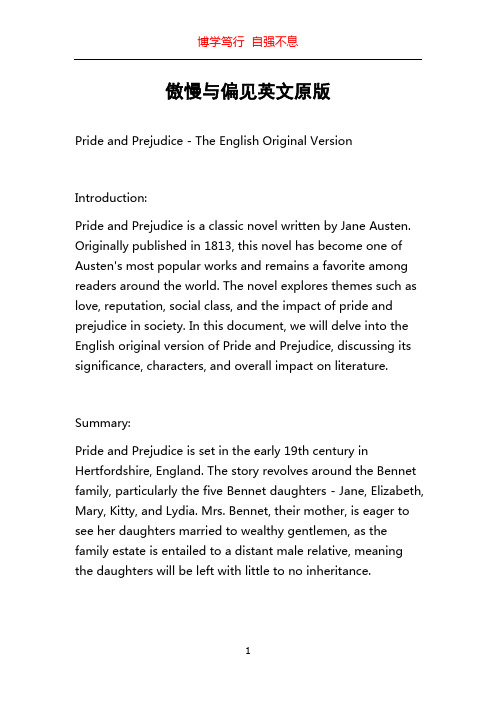
傲慢与偏见英文原版Pride and Prejudice - The English Original VersionIntroduction:Pride and Prejudice is a classic novel written by Jane Austen. Originally published in 1813, this novel has become one of Austen's most popular works and remains a favorite among readers around the world. The novel explores themes such as love, reputation, social class, and the impact of pride and prejudice in society. In this document, we will delve into the English original version of Pride and Prejudice, discussing its significance, characters, and overall impact on literature.Summary:Pride and Prejudice is set in the early 19th century in Hertfordshire, England. The story revolves around the Bennet family, particularly the five Bennet daughters - Jane, Elizabeth, Mary, Kitty, and Lydia. Mrs. Bennet, their mother, is eager to see her daughters married to wealthy gentlemen, as the family estate is entailed to a distant male relative, meaning the daughters will be left with little to no inheritance.The novel explores the romantic relationships between the Bennet sisters and various suitors. The eldest sister Jane falls in love with the wealthy and amiable Charles Bingley, while Elizabeth, the second eldest, forms a complicated relationship with the arrogant yet intriguing Mr. Darcy. Their relationship is initially marked by misunderstanding and prejudice, but as the story progresses, both characters learn to look beyond their own pride and prejudices, ultimately leading to a changing dynamic between them.Themes:1. Love and Marriage: Love and marriage are central themes in Pride and Prejudice. Characters in the novel are often motivated by the desire to find love and secure a suitable marriage. In the Regency era, social status and wealth played a significant role in one's marriage prospects, and Austen explores the challenges faced by women in a society with such strict expectations.2. Social Class: Social class is another prevalent theme in the novel. The Bennet family belongs to the lower gentry class, while characters like Mr. Darcy and his family are from the upper class. The divisions between the classes influence the relationships and interactions between characters,highlighting the disparity and prejudices that existed in Austen's time.3. Prejudice and Judgement: Pride and Prejudice examines the consequences of prejudice and snap judgements. Throughout the story, characters make assumptions about one another based on social status, appearance, or rumors they have heard. These prejudices often lead to misunderstandings and strained relationships.Characters:1. Elizabeth Bennet: The protagonist of the novel, Elizabeth is intelligent, witty, and independent-minded. She is known for her strong opinions and refuses to marry for convenience, seeking a partner who respects and cherishes her.2. Mr. Darcy: Mr. Darcy is initially portrayed as haughty and distant. However, as the story progresses, his true character is revealed, displaying loyalty, generosity, and a capacity for growth. Despite his flaws, he becomes a beloved character due to his eventual transformation.3. Jane Bennet: Jane is the eldest Bennet sister, known for her beauty, kindness, and gentleness. She forms a romanticattachment with Charles Bingley, serving as a foil to her sister Elizabeth's more outspoken nature.4. Charles Bingley: Bingley is a wealthy and amiable young man who falls in love with Jane. He is kind-hearted and easily influenced by others, particularly his close friend, Mr. Darcy.5. Mrs. Bennet: Mrs. Bennet is the mother of the Bennet sisters. She is obsessed with securing advantageous marriages for her daughters, often appearing foolish and overly concerned with social status.Impact:Pride and Prejudice remains one of the most influential and widely read novels in English literature. It has been adapted into numerous film and television adaptations, further cementing its place in popular culture. The novel's exploration of love, social class, and the consequences of prejudice continues to resonate with readers of all ages, making it a timeless classic.Conclusion:Pride and Prejudice, in its original English version, offers readers a captivating story that explores the complexities oflove, social class, and the impact of pride and prejudice in society. Jane Austen's memorable characters and insightful observations continue to captivate audiences, cementing the novel's position as one of the greatest works of English literature. Whether it is through the pages of the book or adaptations on screen, the story of Elizabeth Bennet and Mr. Darcy continues to enchant readers and remind us of the enduring power of love and understanding.。
傲慢与偏见英语稿
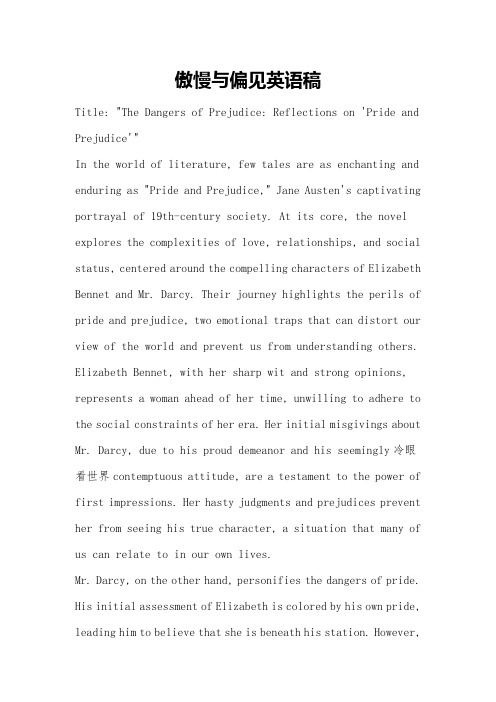
傲慢与偏见英语稿Title: "The Dangers of Prejudice: Reflections on 'Pride and Prejudice'"In the world of literature, few tales are as enchanting and enduring as "Pride and Prejudice," Jane Austen's captivating portrayal of 19th-century society. At its core, the novel explores the complexities of love, relationships, and social status, centered around the compelling characters of Elizabeth Bennet and Mr. Darcy. Their journey highlights the perils of pride and prejudice, two emotional traps that can distort our view of the world and prevent us from understanding others. Elizabeth Bennet, with her sharp wit and strong opinions, represents a woman ahead of her time, unwilling to adhere to the social constraints of her era. Her initial misgivings about Mr. Darcy, due to his proud demeanor and his seemingly冷眼看世界contemptuous attitude, are a testament to the power of first impressions. Her hasty judgments and prejudices prevent her from seeing his true character, a situation that many of us can relate to in our own lives.Mr. Darcy, on the other hand, personifies the dangers of pride. His initial assessment of Elizabeth is colored by his own pride, leading him to believe that she is beneath his station. However,as their relationship progresses and he gains a deeper understanding of her, he overcomes his pride and falls in love with her. His transformation highlights the transformative power of understanding and empathy.The novel's exploration of pride and prejudice is not limited to the romantic relationship between Elizabeth and Mr. Darcy. The Bennet family, with their various relationships and interactions, provides further examples of how these two emotions can distort our view of others. Mrs. Bennet's obsession with marrying off her daughters is rooted in pride, as she seeks social status through their marriages, while Mr. Bennet's detachment and sarcasm stem from a deep-seated prejudice against the world and those closest to him.In today's world, where social media and instant judgments often lead us to form strong opinions based on limited information, Austen's tale remains as relevant as ever. The dangers of pride and prejudice are ever-present, shaping our interactions and limiting our ability to understand those who differ from us. Only through open communication, deep reflection, and an unbiased approach can we hope to overcome these emotional traps and build meaningful relationships.In conclusion, "Pride and Prejudice" serves as a valuablereminder of the importance of critical thinking andopen-mindedness. It urges us to question our own prejudices and the assumptions we make about others. By examining our own pride and prejudices, we can gain a deeper understanding of ourselves and those around us, fostering a more inclusive and compassionate society.。
傲慢与偏见(英文)

• The marriage between Jane Bennet and Bingley is also an example of successful marriage.
• However, unlike Darcy and Elizabeth, there is a flaw in their relationship. The flaw is that both characters are too gullible and too good-hearted to ever act strongly agai separate them.
Pride and Prejudice
The director
• Joe Wright • He is a famous UK director
The actors and actresses
Keira Knightley
Matthew Macfadyen
Rosamund Pike
• Judi Dench
A short introduction
• Mrs. Bennet, a foolish woman who talks too much and is obsess with getting her daughters married.
• There are seven different marriages presented in the moive.
The end
• The marriage between Mr. Collins and Charlotte is based on economics rather than on love or appearance. It was a common practice during Austen's time for women to marry a husband to save herself from spinsterhood or to gain financial security.
傲慢与偏见英文译本
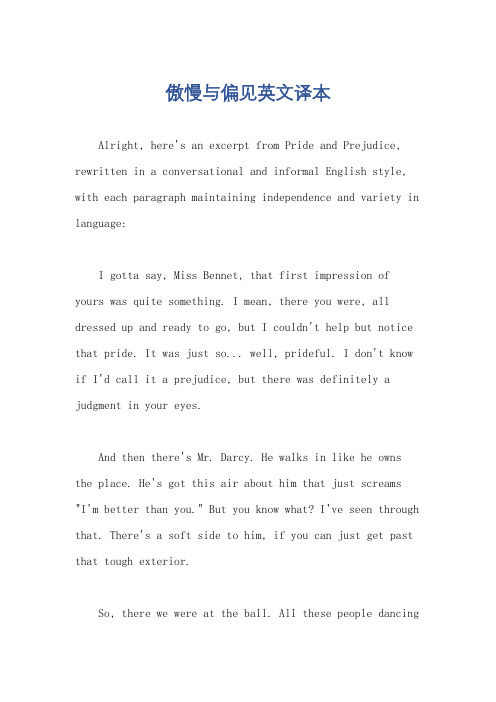
傲慢与偏见英文译本Alright, here's an excerpt from Pride and Prejudice, rewritten in a conversational and informal English style, with each paragraph maintaining independence and variety in language:I gotta say, Miss Bennet, that first impression of yours was quite something. I mean, there you were, all dressed up and ready to go, but I couldn't help but notice that pride. It was just so... well, prideful. I don't know if I'd call it a prejudice, but there was definitely a judgment in your eyes.And then there's Mr. Darcy. He walks in like he owns the place. He's got this air about him that just screams"I'm better than you." But you know what? I've seen through that. There's a soft side to him, if you can just get past that tough exterior.So, there we were at the ball. All these people dancingand chatting, but you and Mr. Darcy? You two just stood there, staring at each other like you were the only ones in the room. It was almost like you had this magnetic pull between you, but then again, maybe it was just two stubborn people refusing to give in.You know, sometimes I think we all judge a book by its cover. We see someone's pride or prejudice and we make up our minds about them without really knowing them. Butthat's the thing, isn't it?。
傲慢与偏见英文精读
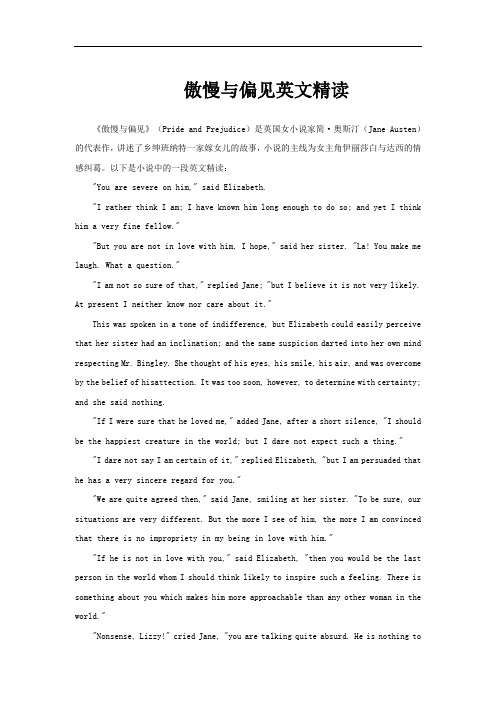
傲慢与偏见英文精读《傲慢与偏见》(Pride and Prejudice)是英国女小说家简·奥斯汀(Jane Austen)的代表作,讲述了乡绅班纳特一家嫁女儿的故事,小说的主线为女主角伊丽莎白与达西的情感纠葛。
以下是小说中的一段英文精读:"You are severe on him," said Elizabeth."I rather think I am; I have known him long enough to do so; and yet I think him a very fine fellow.""But you are not in love with him, I hope," said her sister. "La! You make me laugh. What a question.""I am not so sure of that," replied Jane; "but I believe it is not very likely. At present I neither know nor care about it."This was spoken in a tone of indifference, but Elizabeth could easily perceive that her sister had an inclination; and the same suspicion darted into her own mind respecting Mr. Bingley. She thought of his eyes, his smile, his air, and was overcome by the belief of hisattection. It was too soon, however, to determine with certainty; and she said nothing."If I were sure that he loved me," added Jane, after a short silence, "I should be the happiest creature in the world; but I dare not expect such a thing.""I dare not say I am certain of it," replied Elizabeth, "but I am persuaded that he has a very sincere regard for you.""We are quite agreed then," said Jane, smiling at her sister. "To be sure, our situations are very different. But the more I see of him, the more I am convinced that there is no impropriety in my being in love with him.""If he is not in love with you," said Elizabeth, "then you would be the last person in the world whom I should think likely to inspire such a feeling. There is something about you which makes him more approachable than any other woman in the world.""Nonsense, Lizzy!" cried Jane, "you are talking quite absurd. He is nothing tome farther than a common acquaintance. Why should he be in love with me? And even if he were, why should I wish to marry him?""Because you are in love。
《傲慢与偏见》经典英文段落篇3篇

《傲慢与偏见》经典英文段落篇《傲慢与偏见》是简·奥斯汀的'代表作,小说讲述了乡绅之女伊丽莎白·班内特的爱情故事。
下面小编为大家带来《傲慢与偏见》经典英文段落,欢迎大家阅读!《傲慢与偏见》经典英文段落篇1NOT all that Mrs. Bennet, however, with the assistance of her five daughters, could ask on the subject was sufficient to draw from her husband any satisfactory description of Mr. Bingley. They attacked him in various ways; with barefaced questions, ingenious suppositions, and distant surmises; but he eluded the skill of them all; and they were at last obliged to accept the second-hand intelligence of their neighbour Lady Lucas. Her report was highly favourable. Sir William had been delighted with him. He was quite young, wonderfully handsome, extremely agreeable, and, to crown the whole, he meant to be at the next assembly with a large party. Nothing could be more delightful! To be fond of dancing was a certain step towards falling in love; and very lively hopes of Mr. Bingley's heart were entertained.Mr. Bingley was good looking and gentlemanlike; he had a pleasant countenance, and easy, unaffected manners. His brother-in-law, Mr. Hurst, merely looked the gentleman; but his friend Mr. Darcy soon drew the attention of the room by his fine, tall person, handsome features, noble mien; and the report which was in general circulation within five minutes after his entrance, of his having ten thousand a year. The gentlemen pronounced him to be a fine figure of a man, the ladies declared he was much handsomer than Mr. Bingley, and he was looked at with great admiration for about half the evening, till his manners gave a disgust which turned the tide of his popularity; for he wasdiscovered to be proud, to be above his company, and above being pleased; and not all his large estate in Derbyshire could then save him from having a most forbidding, disagreeable countenance, and being unworthy to be compared with his friend.Mr. Bingley had soon made himself acquainted with all the principal people in the room; he was lively and unreserved, danced every dance, was angry that the ball closed so early, and talked of giving one himself at Netherfield. Such amiable qualities must speak for themselves. What a contrast between him and his friend! Mr. Darcy danced only once with Mrs. Hurst and once with Miss Bingley, declined being introduced to any other lady, and spent the rest of the evening in walking about the room, speaking occasionally to one of his own party. His character was decided. He was the proudest, most disagreeable man in the world, and every body hoped that he would never come there again. Amongst the most violent against him was Mrs. Bennet, whose dislike of his general behaviour was sharpened into particular resentment by his having slighted one of her daughters.《傲慢与偏见》经典英文段落篇2Mr. Bingley followed his advice. Mr. Darcy walked off; and Elizabeth remained with no very cordial feelings towards him. She told the story however with great spirit among her friends; for she had a lively, playful disposition, which delighted in any thing ridiculous.The evening altogether passed off pleasantly to the whole family. Mrs. Bennet had seen her eldest daughter much admired by the Netherfield party. Mr. Bingley had danced with her twice, and she had been distinguished by his sisters. Jane was as much gratified by this as her mother could be, though in a quieter way.Elizabeth felt Jane's pleasure. Mary had heard herself mentioned to Miss Bingley as the most accomplished girl in the neighbourhood; and Catherine and Lydia had been fortunate enough to be never without partners, which was all that they had yet learnt to care for at a ball. They returned therefore, in good spirits to Longbourn, the village where they lived, and of which they were the principal inhabitants. They found Mr. Bennet still up. With a book, he was regardless of time; and on the present occasion he had a good deal of curiosity as to the event of an evening which had raised such splendid expectations. He had rather hoped that all his wife's views on the stranger would be disappointed; but he soon found that he had a very different story to hear."Oh! my dear Mr. Bennet," as she entered the room, "we have had a most delightful evening, a most excellent ball. I wish you had been there. Jane was so admired, nothing could be like it. Every body said how well she looked; and Mr. Bingley thought her quite beautiful, and danced with her twice. Only think of that my dear; he actually danced with her twice; and she was the only creature in the room that he asked a second time. First of all, he asked Miss Lucas. I was so vexed to see him stand up with her; but, however, he did not admire her at all: indeed, nobody can, you know; and he seemed quite struck with Jane as she was going down the dance. So, he enquired who she was, and got introduced, and asked her for the two next. Then, the two third he danced with Miss King, and the two fourth with Maria Lucas, and the two fifth with Jane again, and the two sixth with Lizzy, and the Boulanger --"《傲慢与偏见》经典英文段落篇3IN consequence of an agreement between the sisters,Elizabeth wrote the next morning to her mother, to beg that the carriage might be sent for them in the course of the day. But Mrs. Bennet, who had calculated on her daughters remaining at Netherfield till the following Tuesday, which would exactly finish Jane's week, could not bring herself to receive hem with pleasure before. Her answer, therefore, was not propitious, at least not to Elizabeth's wishes, for she was impatient to get home. Mrs. Bennet sent them word that they could not possibly have the carriage before Tuesday; and in her postscript it was added that, if Mr. Bingley and his sister pressed them to stay longer, she could spare them very well. -- Against staying longer, however, Elizabeth was positively resolved -- nor did she much expect it would be asked; and fearful, on the contrary, as being considered as intruding themselves needlessly long, she urged Jane to borrow Mr. Bingley's carriage immediately, and at length it was settled that their original design of leaving Netherfield that morning should be mentioned, and the request made.The communication excited many professions of concern; and enough was said of wishing them to stay at least till the following day, to work on Jane; and till the morrow their going was deferred. Miss Bingley was then sorry that she had proposed the delay, for her jealousy and dislike of one sister much exceeded her affection for the other.The master of the house heard with real sorrow that they were to go so soon, and repeatedly tried to persuade Miss Bennet that it would not be safe for her -- that she was not enough recovered; but Jane was firm where she felt herself to be right.。
傲慢与偏见经典段落英文摘抄阅读

傲慢与偏见经典段落英文摘抄阅读《傲慢与偏见》是简·奥斯汀的代表作。
小说讲述了乡绅之女伊丽莎白·班内特的爱情故事。
下面店铺为大家带来《傲慢与偏见》经典段落英文,欢迎大家阅读!《傲慢与偏见》经典段落英文篇1It is a truth universally acknowledged, that a single man in possession of a good fortune must be in want of a wife. However little known the feelings or views of such a man may be on his first entering a neighbourhood, this truth is so well fixed in the minds of the surrounding families, that he is considered as the rightful property of some one or other of their daughters.Mr. Bennet was so odd a mixture of quick parts, sarcastic humour, reserve, and caprice, that the experience of three and twenty years had been insufficient to make his wife understand his character. Her mind was less difficult to develope. She was a woman of mean understanding, little information, and uncertain temper. When she was discontented, she fancied herself nervous. The business of her life was to get her daughters married; its solace was visiting and news.Elizabeth listened in silence, but was not convinced. Their behaviour at the assembly had not been calculated to please in general; and with more quickness of observation and less pliancy of temper than her sister, and with a judgment, too, unassailed by any attention to herself, she was very little disposed to approve them. They were in fact very fine ladies, not deficient in good humour when they were pleased, nor in the power of being agreeable where they chose it; but proud and conceited.《傲慢与偏见》经典段落英文篇2They were rather handsome, had been educated in one ofthe first private seminaries in town, had a fortune of twenty thousand pounds, were in the habit of spending more than they ought, and of associating with people of rank; and were therefore in every respect entitled to think well of themselves, and meanly of others. They were of a respectable family in the north of England; a circumstance more deeply impressed on their memories than that their brother's fortune and their own had been acquired by trade.Mr. Bingley inherited property to the amount of nearly an hundred thousand pounds from his father, who had intended to purchase an estate, but did not live to do it. -- Mr. Bingley intended it likewise, and sometimes made choice of his county; but as he was now provided with a good house and the liberty of a manor, it was doubtful to many of those who best knew the easiness of his temper, whether he might not spend the remainder of his days at Netherfield, and leave the next generation to purchase.His sisters were very anxious for his having an estate of his own; but though he was now established only as a tenant, Miss Bingley was by no means unwilling to preside at his table, nor was Mrs. Hurst, who had married a man of more fashion than fortune, less disposed to consider his house as her home when it suited her. Mr. Bingley had not been of age two years, when he was tempted by an accidental recommendation to look at Netherfield House. He did look at it and into it for half an hour, was pleased with the situation and the principal rooms, satisfied with what the owner said in its praise, and took it immediately. 《傲慢与偏见》经典段落英文篇3The manner in which they spoke of the Meryton assembly was sufficiently characteristic. Bingley had never met withpleasanter people or prettier girls in his life; everybody had been most kind and attentive to him, there had been no formality, no stiffness; he had soon felt acquainted with all the room; and as to Miss Bennet, he could not conceive an angel more beautiful. Darcy, on the contrary, had seen a collection of people in whom there was little beauty and no fashion, for none of whom he had felt the smallest interest, and from none received either attention or pleasure. Miss Bennet he acknowledged to be pretty, but she smiled too much.Darcy only smiled, and the general pause which ensued made Elizabeth tremble lest her mother should be exposing herself again. She longed to speak, but could think of nothing to say; and after a short silence Mrs. Bennet began repeating her thanks to Mr. Bingley for his kindness to Jane with an apology for troubling him also with Lizzy. Mr. Bingley was unaffectedly civil in his answer, and forced his younger sister to be civil also, and say what the occasion required. She performed her part, indeed, without much graciousness, but Mrs. Bennet was satisfied, and soon afterwards ordered her carriage. Upon this signal, the youngest of her daughters put herself forward. The two girls had been whispering to each other during the whole visit, and the result of it was, that the youngest should tax Mr. Bingley with having promised on his first coming into the country to give a ball at Netherfield.Lydia was a stout, well-grown girl of fifteen, with a fine complexion and good-humoured countenance; a favourite with her mother, whose affection had brought her into public at an early age. She had high animal spirits, and a sort of natural self-consequence, which the attentions of the officers, to whom her uncle's good dinners and her own easy manners recommendedher, had increased into assurance. She was very equal, therefore, to address Mr. Bingley on the subject of the ball, and abruptly reminded him of his promise; adding, that it would be the most shameful thing in the world if he did not keep it. His answer to this sudden attack was delightful to their mother's ear.猜你喜欢:。
傲慢与偏见黑布林英语阅读
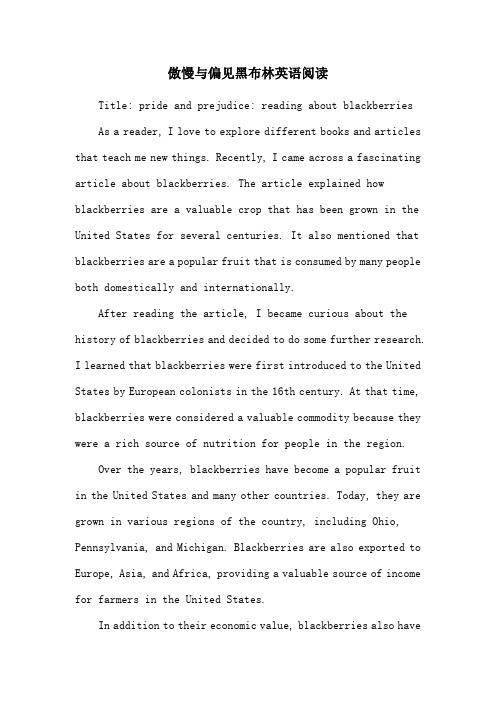
傲慢与偏见黑布林英语阅读Title: pride and prejudice: reading about blackberriesAs a reader, I love to explore different books and articles that teach me new things. Recently, I came across a fascinating article about blackberries. The article explained how blackberries are a valuable crop that has been grown in the United States for several centuries. It also mentioned that blackberries are a popular fruit that is consumed by many people both domestically and internationally.After reading the article, I became curious about the history of blackberries and decided to do some further research.I learned that blackberries were first introduced to the United States by European colonists in the 16th century. At that time, blackberries were considered a valuable commodity because they were a rich source of nutrition for people in the region.Over the years, blackberries have become a popular fruit in the United States and many other countries. Today, they are grown in various regions of the country, including Ohio, Pennsylvania, and Michigan. Blackberries are also exported to Europe, Asia, and Africa, providing a valuable source of income for farmers in the United States.In addition to their economic value, blackberries also havecultural significance in many parts of the world. In the United Kingdom, blackberries are considered a symbol of autumn and are often used in autumnal decorations. In Australia, blackberries are considered a native fruit and are often consumed by Australians both domestically and internationally.Overall, the article about blackberries was fascinating and provided me with a lot of new information. I learned about the history of blackberries, their economic value, and their cultural significance. I"m now even more interested in exploring the world of blackberries and their potential to bring joy and nourishment to people.。
傲慢与偏见 英文 精读
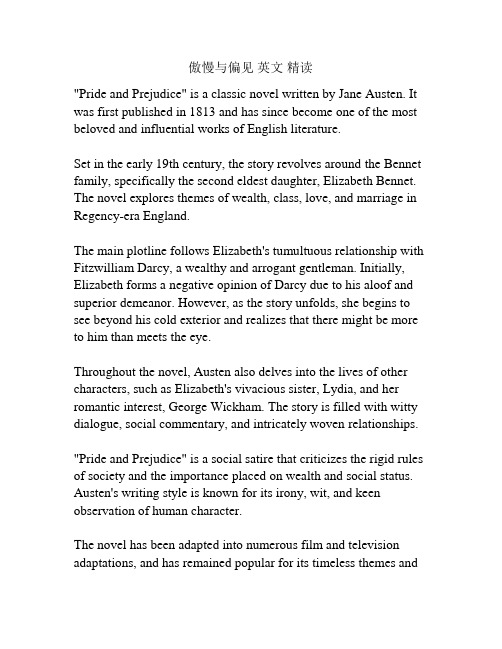
傲慢与偏见英文精读"Pride and Prejudice" is a classic novel written by Jane Austen. It was first published in 1813 and has since become one of the most beloved and influential works of English literature.Set in the early 19th century, the story revolves around the Bennet family, specifically the second eldest daughter, Elizabeth Bennet. The novel explores themes of wealth, class, love, and marriage in Regency-era England.The main plotline follows Elizabeth's tumultuous relationship with Fitzwilliam Darcy, a wealthy and arrogant gentleman. Initially, Elizabeth forms a negative opinion of Darcy due to his aloof and superior demeanor. However, as the story unfolds, she begins to see beyond his cold exterior and realizes that there might be more to him than meets the eye.Throughout the novel, Austen also delves into the lives of other characters, such as Elizabeth's vivacious sister, Lydia, and her romantic interest, George Wickham. The story is filled with witty dialogue, social commentary, and intricately woven relationships."Pride and Prejudice" is a social satire that criticizes the rigid rules of society and the importance placed on wealth and social status. Austen's writing style is known for its irony, wit, and keen observation of human character.The novel has been adapted into numerous film and television adaptations, and has remained popular for its timeless themes andmemorable characters. It continues to be studied and enjoyed by readers of all ages.。
(word完整版)年版傲慢与偏见英文

1. EXT. LONGBOURN HOUSE - DAY.FADE UP ON: A YOUNG WOMAN, as she walks through a field of tall, meadow grass. She is reading a novel entitled 'First Impressions'.This is LIZZIE BENNET, 20, good humoured, attractive, and nobody's fool. She approaches Longbourn, a fairly run down 17th Century house with a small moat around it. Lizzie jumps up onto a wall and crosses the moat by walking a wooden plank duck board, a reckless trick learnt in early childhood. She walks passed the back of the house where, through an open window to the library, we see her mother and father, MR and MRS BENNET.MRS BENNET: My dear Mr Bennet, have you heard that Netherfield Park is let at last?We follow Lizzie into the house, but still overhear her parents' conversation.MRS BENNET: (cont'd) Do you not want to know who has taken it?MR BENNET: As you wish to tell me, I doubt I have any choice in the matter.2. INT. LONGBOURN - CONTINUOUS.As Lizzie walks through the hallway, we hear the sound of piano scales plodding through the afternoon. She walks down the entrance hall past the room where MARY (18) the bluestocking of the family, is practising, and finds KITTY (16) and LYDIA (15) are listening at the door to the library. Lizzie pokes Lydia.LIZZIE: Liddy! Kitty - what have I told you about listening at –LYDIA: Never mind that, there's a Mr Bingley arrived from the NorthKITTY: - with more than one chaiseLYDIA: - and five thousand a year!LIZZIE: Really?LYDIA: And he's single!JANE, the eldest and very beautiful if rather naive sister, materializes at Lizzie's elbow.JANE: Who's single?LIZZIE: A Mr Bingley, apparently.KITTY: Shhhh!She clamps her ear to the door.LIZZIE: Oh, really Kitty.Lydia leans in, whilst Jane and Lizzie strain to hear without appearing to.3. INT. LIBRARY - LONGBOURN - CONTINUOUS.Mr Bennet is trying to ignore Mrs Bennet.MRS BENNET: What a fine thing for our girls!MR BENNET: How can it affect them?MRS BENNET: My dear Mr Bennet, how can you be so tiresome! You know that he must marry one of them.MR BENNET: Oh, so that is his design in settling here?Mr Bennet takes a plant he's been looking at from his table and walks out of the library into the corridor, where the girls are gathered, Mrs Bennet following.MR BENNET: (cont'd) Good heavens. People.4. INT. CORRIDOR - LONGBOURN - THE SAME.He walks through the girls to the drawing room pursued by Mrs Bennet.MRS BENNET: - So you must go and visit him at once.5. INT. DRAWING ROOM - LONGBOURN - THE SAME.Mr Bennet walks to a table and places the plant in the light. Mary is still practising the piano. The girls flock behind him.LYDIA: Are you listening? You never listen.KITTY: You must, Papa!MRS BENNET: At once!MR BENNET: There is no need, for I already have.The piano stops. A frozen silence. They all stare.MRS BENNET: You have?JANE: When?MRS BENNET: How can you tease me, Mr Bennet? Have you no compassion for my poor nerves?MR BENNET: You mistake me, my dear. I have a high respect for them; they have been my constant companions these twenty years.MRS BENNET: Is he amiable?MARY: Who?KITTY: Is he handsome?MARY: Who?LYDIA: He's sure to be handsome.LIZZIE: (ironically) With five thousand a year, would not matter if he had warts and a leer.MR BENNET: I will give my hearty consent to his marrying whichever of the girls he chooses. Warts and all. MARY: Who's got warts?LYDIA: So will he come to the ball tomorrow?MR BENNET: I believe so.Lydia and Kitty shriek with excitement and jump up and down.KITTY: (to Jane) I have to have your spotted muslin, Jane!LYDIA: No, I need it! It makes Kitty look like a pudding.KITTY: - Oh please Jane, I'll lend you my green slippers.They both look onto Jane and pull at her arms. Mr Bennet winks at Lizzie.6. EXT. LONGBOURN HOUSE - DAY.A wide shot of the house as we continue to hear the girls argue over what they will wear.7. INT. ASSEMBLY ROOMS - MERYTON VILLAGE - NIGHT.The local subscription dance is in full swing, (Dance 1). It's a rough-and-ready, though enthusiastic affair: yeoman farmers, small-time squires with their ruddy-cheeked daughters.Lydia and Kitty are dancing.LYDIA: I can't breathe. How am I going to dance all night if I can't breathe?KITTY: My toes hurt already.Lizzie and Jane are a little apart from their family. Jane looks breathtaking.LIZZIE: Well, if every man in this room does not end the evening in love with you then I am no judge of beauty. JANE: Or men.LIZZIE: Oh, they are far too easy to judge.JANE: They are not all bad.LIZZIE: Humourless poppycocks, in my limited experience.JANE: One of these days, Lizzie, someone will catch your eye and then you'll have to watch your tongue.She stops speaking and stares. A dazzling group enters the room: George Charles Bingley (25) a good hearted soul but prone to bumbling embarrassment when his enthusiasms get the better of him, his sister Caroline (23) a victim of every latest fashion, counting herself superior to most company she encounters, and finally, Mr Fitzwilliam Darcy (27) dashing, brooding with an introversion which could be misconstrued as hauteur. They are dressed in the highest modes. The music and dancing stops as the local people turn and stare. The newcomers - creatures from another world - make quite a stir. Darcy surveys the hall. He catches Lizzie's eye. She stares, with a kind of surprised shock. Caroline Bingley turns to Darcy.CAROLINE: Oh dear, we are a long way from Grosvenor Square, are we not, Mr Darcy?He does indeed look superior to the assembled company.SIR WILLIAM LUCAS (53) a hale but unsophisticated member of the self-made gentry, hurries to greet the new arrivals. He leads them down the center of the dance floor towards the best seats in the room, stopping occasionally to introduce them to various parties.Lizzie's great friend Charlotte Lucas, Sir Williams’ daughter - an intelligent, sensible woman in her late twenties, comes to Lizzie's side.LIZZIE: So which of the painted peacocks is our Mr Bingley?CHARLOTTE: He is on the right, and on the left is his sister.LIZZIE: And the person with the quizzical brow?CHARLOTTE: That is his good friend, 'Mr Darcy.LIZZIE: He looks miserable, poor soul.CHARLOTTE: Miserable he may be, but poor he most certainly is not.LIZZIE: Tell me.CHARLOTTE: Ten thousand a year and he owns half of Derbyshire.LIZZIE: The miserable half?They share a complicit giggle.Sir William Lucas arrives with Darcy and the Bingley's to introduce his daughter Charlotte and the Bennet family. Behind them the music and dancing re-start where they left off.SIR WILLIAM: (to Mr Bingley) My eldest daughter you know, Mrs Bennet, Miss Jane Bennet, Elizabeth and Miss Mary Bennet.MRS BENNET: It is a pleasure. I have two others but they are already dancing.Mr Bingley is transfixed by Jane and gazes openly at her.MR BINGLEY: Delighted to make your acquaintance.SIR WILLIAM: And may I introduce Mr Darcy. (Significant look) - of Pemberley, in Derbyshire!A stiff bow from Darcy, Lizzie smiles, Darcy does not.8. INT. ASSEMBLY ROOMS - MERYTON VILLAGE - NIGHT.Moments later. Lizzie is standing in a small group with Jane, Bingley, Miss Bingley and Darcy.JANE: How do you like it here in Hertfordshire, Mr Bingley?MR BINGLEY: (smiling at Jane shyly) Very much.LIZZIE: The library at Netherfield, I've heard, is one of the finest in the country.MR BINGLEY: Yes, it fills me with guilt.He looks at Jane and a little blush starts around his collar.BINGLEY: Not a good reader, you see. I prefer being out of doors. I mean, I can read, of course and, and I'm not suggesting you can't read outdoors - of course.JANE: I wish I read more, but there always seems so many other things to do.BINGLEY: That's exactly what I meant.He beams at Jane, gratefully. The first dance ends. Lydia and Kitty rush past in a state of high excitement.LYDIA: Mama! You will never ever ever ever believe what I'm about to tell you!MR BENNET: You've decided to take the veil?Lydia ignores him.MRS BENNET: Tell me quickly, my loveLYDIA: (shrieking) The regiment are coming!Mrs Bennet shrieks too. Mr Bennet winces.KITTY: They're to be stationed the whole winter! Stationed in the village, just right there!Now all three Bennet females shriek and Lydia actually jumps up and down.LYDIA: Officers! Officers as far as the eye can see!KITTY: How will we meet them?LYDIA: It's easy. You just walk up and down in front of them and drop something.Lydia pantomimes the actions for Kitty.LYDIA: (cont'd) They pick it up. You say 'Oh thank you sir' and blush prettily and then you're introduced!Couples begin to form for the next dance. Mr Bingley turns to Jane.MR BINGLEY: May I have the honour?They leave to dance (Dance 2). Lizzie addresses Darcy as much to distract him from her family as for any other reason. LIZZIE: Do you dance Mr Darcy?DARCY: Not if I can help it.Lizzie, Darcy and Miss Bingley stand in uncompanionable silence.On the dance floor Mr Bingley is dancing with Jane. His ears are bright pink. Mrs Bennet, with a group of other mothers, watches the young couple with rather too obvious a satisfaction.MRS BENNET: That dress becomes her does it not. Though of course my Jane needs little help from couturiers. Lizzie wanders through the throng. She looks at Bingley and Jane dancing - Jane is calm and demure, Bingley clearly smitten.9. INT. ASSEMBLY ROOMS - MERYTON VILLAGE – NIGHT.Later. Darcy is joined by an exhilarated Bingley.MR BINGLEY: Upon my word I've never seen so many pretty girls in my life.DARCY: You are dancing with the only handsome girl in the room.BINGLEY: Oh, she is the most beautiful creature I ever beheld, but her sister Lizzie is very agreeable.They have stopped at the edge of the dance floor but have not seen Lizzie and Charlotte who are hiding behind a pillar. Lizzie starts to smile.DARCY: Perfectly tolerable, I dare say, but not handsome enough to tempt me.Lizzie stops smiling.DARCY: (cont'd) You had better return to your partner and enjoy her smiles, for you are wasting your time with me. Bingley goes off.CUT TO: Lizzie and Charlotte.CHARLOTTE: Count your blessings, Lizzie. If he liked you, you'd have to talk to him.LIZZIE: Precisely. As it is, I would not dance with him for all of Derbyshire, let alone the miserable half.Charlotte smiles at her friend, but sees nonetheless that she is stung.10. INT. ASSEMBLY ROOMS - MERYTON VILLAGE - NIGHT.Later, (Dance 3). Bingley politely dancing with Charlotte. As he does so, he catches sight of Jane dancing with somebody else. A look of pure longing, but he cannot dance every dance with her. Lizzie too is dancing and clocks this. Lydia and Kitty are exuberantly dancing too, laughing and chatting. Darcy stands watching, a look of infinitely superior boredom on his fine features.11. INT. ASSEMBLY ROOMS - MERYTON VILLAGE – NIGHT.Bingley is standing with Jane, Lizzie, Mrs Bennet and Darcy. (Dance 4).BINGLEY: (to Lizzie) Your friend Miss Lucas is a most amusing young woman.LIZZIE: Yes! I adore her.MRS BENNET: It is a pity she is not more handsome.LIZZIE: Mama!MRS BENNET: But Lizzie will never admit she is plain. (to Bingley) Of course it is my Jane Who is considered thebeauty of the county.JANE: Oh, Mama, please!MRS BENNET: When she was only fifteen there was a gentleman so much in love with her that I was sure he would make her an offer. However, he did write her some very pretty verses.LIZZIE: (impatiently) And that put paid to it. I wonder who first discovered the power of poetry in driving away love? DARCY: I thought that poetry was the food of love.LIZZIE: Of a fine, stout love it may. But if it is only a vague inclination, I am convinced that one poor sonnet will kill it stone dead.Darcy looks at Lizzie with a glimmering of interest.DARCY: So what do you recommend, to encourage affection?Lizzie turns and looks at Darcy square on.LIZZIE: Dancing. Even if one’s partner is barely tolerable.She gives him a dazzling smile. Darcy looks startled. He has no idea she heard him. Now it is his turn to blush.End on a wide shot of the assembly rooms and the dance continuing.12. INT. LIZZIE & JANE'S BEDROOM - LONGBOURN - NIGHT.Lizzie and Jane are both in the same bed under the covers. They are too excited to sleep. Jane puts on an extra pair of socks to keep herself warm.JANE: Mr Bingley is just what a young man ought to be. Sensible, good humoured -LIZZIE: (completing the list) Handsome, conveniently rich.JANE: You know perfectly well I do not believe marriage should be driven by thoughts of money.LIZZIE: I agree entirely, only the deepest love will persuade me into matrimony, which is why I will end up an old maid.JANE: Do you really believe he liked me, Lizzie?LIZZIE: Jane, he danced with you most of the night and stared at you for the rest of it. But I give you leave to like him. You've liked many a stupider person.JANE: Lizzie!LIZZIE: You're a great deal too apt to like people in general, you know. All the world is good and agreeable in your eyes.JANE: Not his friend. I still cannot believe what he said about you.LIZZIE: Mr Darcy? I could more easily forgive his vanity had he not wounded mine. But no matter. I doubt we shall ever speak again.We move away from the bed and out through the window to take in the starry night sky.13. INT. DINING ROOM - LONGBOURN - DAY.Mrs Bennet presides over breakfast with an endless description of the ball. Mary is doing some needle work, whilst Lydia, Kitty and Jane blearily eat.MRS BENNET: ...and then he danced the third with Miss Lucas. Poor thing, it is a shame she is not more handsome. There's a spinster in the making and no mistake. The fourth with a Miss King of little standing. And the fifth again with Jane.MR BENNET: If he'd had any compassion for me he would have sprained his ankle in the first set.MRS BENNET: Oh, Mr Bennet! The way you carry on, anybody would think the girls looked forward to a grand inheritance.Lizzie rolls her eyes at Mr Bennet, they've heard this speech many times before.MR BENNET: Kitty, be so kind as to pass the butter.MRS BENNET: As you well know, Mr Bennet, when you die, which may in fact be very soonMR BENNET: As soon as I can manage it.MRS BENNET: - our girls will be left without a roof over their head nor a penny to their name.LIZZIE: Oh Mother, please! It's ten in the morning.Betsy, the maid, enters the room and interrupts Mrs Bennet's babbling.BETSY: A letter addressed to Miss Bennet, Ma’am. From Netherfield Hall.MRS BENNET: Praise the Lord! We are saved.Mrs Hill gives the letter to Jane.MRS BENNET: (cont'd) Make haste, Jane, make haste. O happy day!Mrs Bennet takes Jane's toast from her hand and whips her napkin off.JANE: It is from Caroline.Mrs Bennet is stopped in her tracks.JANE: (cont’d) She has invited me to dine with h er. (pause) Her brother will be dining out.MRS BENNET: Dining out?JANE: Can I take the carriage?MRS BENNET: Out where? Let me see that.She tweaks the letter from Jane's grasp.JANE: It is too far too walk.MRS BENNET: Unaccountable of him. Dining out, indeed.LIZZIE: Mama! The carriage? For Jane?MRS BENNET: Certainly not. She'll go on horseback.LIZZIE/JANE: Horseback?14. EXT. COUNTRYSIDE - DAY.Jane rides through the countryside. A distant rumble of thunder. She looks up...15 SCENE DELETED.16 SCENE DELETED.17. EXT. GARDEN – DAY.A louder rumble of thunder. Betsy hastily pulls clothes from a line, it's bucketing down heavily now. Lizzie runs through the garden. She pulls a towel from the washing line as she passes.18. EXT/INT. HALL/DINING ROOM. LONGBOURN - DAY.Mr and Mrs Bennet look out at the pouring rain. Lizzie rushes in with the towel and begins drying her hair with it. Through in the kitchen we can see Mr and Mrs Hill.MRS BENNET: Excellent. Now she will have to stay the night. Exactly as I predicted.MR BENNET: Good grief, woman. Your matchmaking skills are becoming positively occult.LIZZIE: Though I don't think, Mama, you can reasonably take credit for making it rain. Let's hope she doesn't catch her death.19. INT. NETHERFIELD – DAY.A footman opens the great doors to find Jane standing there soaked. She sneezes.20. INT. KITCHEN ROOM - LONGBOURN - DAY.Lizzie reads a letter. Kitty and Lydia are also present.LIZZIE: "And my kind friends will not hear of me returning home until I am better - but do not be alarmed excepting a sore throat, a fever, and a headache there is nothing wrong with me." I hope you're satisfied, Mother.MR BENNET: Well, my dear, if your daughter does die it will be a comfort to know it was all in pursuit of Mr Bingley. MRS BENNET: People do not die of colds.LIZZIE: Though she might well perish with the shame of having such a mother.Mr Bennet laughs, but Lizzie is genuinely angry.LIZZIE: (cont'd) I am going to Netherfield at once.She stomps out.21. EXT. COUNTRYSIDE/NETHERFIELD - DAY.Lizzie strides across vast muddy fields, slipping as she goes. Netherfield is in view on the horizon. She stops to take it in, then carries on down an even more muddy track.22. INT. NETHERFIELD - BREAKFAST ROOM - DAY.In the large grand dining room Caroline and Darcy are eating breakfast. It's very formal, in fact frigid, compared to the volatile Bennet household. Darcy is reading the newspaper, Caroline is reading a letter.CAROLINE: (puts down the letter) Apparently, -Lady Bathurst is redecorating her ballroom in the French style. A little unpatriotic, don't you think?Mr Darcy is about to answer when the door opens. A footman appears, his face rigid with disapproval. FOOTMAN: Miss Lizzie Bennet.Lizzie comes in, her face flushed, her skirt covered in mud. She looks ravishing. Darcy stares at her, then quickly rises to his feet. Caroline Bingley, astonished, looks her up and down.CAROLINE: Good Lord, Miss Bennet. Have you walked here?LIZZIE: I have. I'm so sorry. How is my sister?DARCY: (more kindly) She’s upstairs. (to footman) Show Miss Bennet the way, Alfred.Lizzie leaves. A beat.CAROLINE: Goodness, did you see her petticoat? Six inches deep in mud!No response.CAROLINE: (cont'd) And her hair, so blowsy and untidy!DARCY: I think her concern for her sister does her credit.A little pause, Caroline recovers.CAROLINE: Oh yes, it's shocking to have a bad cold. I dislike excessively being ill myself.23. INT. NETHERFIELD STAIRS - DAY.Lizzie races up the stairs to meet Bingley half way. His face lights up when he sees her.BINGLEY: Miss Lizzie! Oh I'm so glad to see youLIZZIE: How is she?BINGLEY: She has a violent cold, but we shall get the better of it. I will have a bed made up for you. You must be our guest here until Jane recovers.24. INT. NETHERFIELD - JANE'S BEDROOM - DAY.Lizzie goes into the bedroom where Jane lies in bed, feverish and ill. The blinds are drawn.LIZZIE: Jane!Jane's face lights up. Lizzie kisses her.JANE: Lizzie! Oh, your face is so cold. They're being so kind to me, I feel such a terrible imposition.LIZZIE: Don't worry. I don't know who is more pleased at your being here, Mama or Mr Bingley.Bingley enters.LIZZIE: (cont'd) Thank you, for tending to my sister so diligently, it seems she is in better comfort here than she would be at home.BINGLEY: It is a pleasure - I mean - not a pleasure that she's ill, of course not, but a pleasure that she's here - being ill.25. INT. STAIRCASE - NETHERFIELD - DAY.Caroline berates her brother.CAROLINE: Stay!? She is a perfectly sweet girl but save being an excellent walker, there is very little to recommend her as a house-guest.BINGLEY: I thought she showed remarkable spirit coming all this way.CAROLINE: The eldest Miss Bennet, as you know, I hold in excessive regard but as for the rest of themShe walks down two steps and then turns back.CAROLINE: (cont'd) You do realise their uncle is in trade? In Cheapside?BINGLEY: (irritably) If they had uncles enough to fill all Cheapside it would not make them one jot less agreeable, Caroline.26. EXT. YARD - LONGBOURN - DAY.Mr Bennet is admiring a huge boar which has been delivered to cover his sows. Mr Hill, the manservant stands with him. Mrs Bennet bustles up looking smug.MRS BENNET: It's all going according to plan. He's head-over-heels already, now all he needs is a little encouragement.MR BENNET: Who's that, my blossom?MRS BENNET: Oh don't torment me, Mr Bennet. I mean Mr Bingley, as you well know, and he doesn't mind a bit that she hasn't a penny for he has enough for the two of them.Kitty and Lydia rush past as the distant sounds of drums and trumpet mingle with the snipping of Giles's shears. MRS BENNET: (cont'd) Wait for me!Mr Bennet gazes at their departing figures, sucking his teeth with relief. He turns back to the boar.27. EXT. MERYTON VILLAGE - DAY.Mrs Bennet and her two daughters rush down the street into the village. Dogs bark, children run alongside as a regiment of soldiers march through the street. Geese scatter, shopkeepers stand in their doorways. The two Bennet girls simper at the handsome young soldiers. Mrs Bennet, flushed and excited, runs panting behind them. Lydia deliberately drops her handkerchief. One of the soldiers stands on it. She is appalled.28. INT. JANE'S BEDROOM - NETHERFIELD - MORNING.Jane is asleep in bed. Lizzie is awake in a small cot bed next to Jane. She gets up.29. EXT. COUNTRYSIDE - MORNING.Darcy gallops through the countryside still looking put out.30. EXT. BACK LAWN TO PARK LAND - NETHERFIELD - MORNING.Lizzie stands on the edge of the formal garden looking out onto to the rustic parkland. Suddenly Darcy emerges over the crest of a hill and gallops towards the house. He pulls the horse to a halt as he sees Lizzie. With his wet hair flattened against his head and his face soaked in sweat he looks for a second like a mysterious and beautiful boy. They lock eyes for a brief moment before Lizzie turns in a shiver and walks away.31. INT. JANE’S BED ROOM - NETHERFIELD - MORNING.Lizzie enters the room and goes to Jane's bed. Jane is waking up.LIZZIE: Jane, do you think you might feel well enough to leave today?32. INT. DRAWING ROOM - NETHERFIELD - DAY.The doors open. The Footman as before:。
英语简易原著阅读傲慢与偏见情节

Lydia left with Wickham, and said that they will get marry.
So Elizabeth came back, and Mr. Gardiner goes to London to solve this problem.
With Darcy’s help, Lydia and Wickham was found. Finally, they got married.
Afterwards Mr. Darcy wrote a letter to Elizabeth in order to remove her misunderstandings of him.
The regiment leaves Meryton, so her sister Lydia leaves, too.
Another ball at Netherfield, Wickham didn’t came.
Miss Bingley warn her not to trust what Wickham said.
Mr. Collins made a formal proposal of marriage to Elizabeth, she refused.
Plot Summary
A new neighbor called Bingley settled in Netherfield Park. He was a wealthy bachelor.
Mrs. Bennet wanted one of her daughters married him, so she asked Mr. Bennet to visit their new neighbor.
- 1、下载文档前请自行甄别文档内容的完整性,平台不提供额外的编辑、内容补充、找答案等附加服务。
- 2、"仅部分预览"的文档,不可在线预览部分如存在完整性等问题,可反馈申请退款(可完整预览的文档不适用该条件!)。
- 3、如文档侵犯您的权益,请联系客服反馈,我们会尽快为您处理(人工客服工作时间:9:00-18:30)。
mud
wet, soft earth or earthy matter
毫無價值的東西
acceptable
capable or worthy of being accepted
可以接受的
affection
fond attachment, devotion, or love
影響
adventure
應當,應該
fetch
to go and bring back
拿來;去拿...給
delighted
highly pleased.
高興的
manner
a way of doing, being done, or happening
方式,方法
accomplished
completed; done; effected
full of or characterized by enthusiasm
熱心地;滿腔熱情地
mocking
To treat with ridicule or contempt; deride.
嘲弄的
satisfied
content
感到滿意的
ought
used to express duty or moral obligation
集中;聚集
lacking
require
缺少;沒有
quality
an essential or distinctive characteristic, property, or attribute
質;質量
excellent
possessing outstanding quality or superior merit; remarkably good.
變明亮
pause
a temporary stop or rest
暫停
vulgar
characterized by ignorance of or lack of good breeding or taste
粗俗的
cheapside
a district and thoroughfare in London
慎重地
Pain(n.)
a feeling of physical suffering caused by injury or illness
戚普塞街(位於倫敦)
charming
pleasing; delightful
令人高興的
considerably
to a noteworthy or marked extent
相當,非常
position
condition with reference to place
位置,地點
enthusiastically
徹底的;完全的
knowledge
acquaintance with facts, truths, or principles
知識,學識
assistant
a person who assists or gives aid and support
助手,助理
Deliberately(adv.)
slowly and carefully; intentionally
完成了的
boast
to speak with exaggeration and excessive pride
自吹自擂
faithful
strict or thorough in the performance of duty
忠實的;忠誠的
thorough
executed without negligence or omissions
焦慮的;掛念的
determined
resolute; staunch
已下決心的
available
at hand
可用的;在手邊的
accompanied
keep company
陪同;伴隨
impatiently
not patient; not accepting delay
不耐煩地;性急的
considerate
obliged
thankful
感激的
apparent
seeming
表面的;外觀的
satisfied
content:a satisfied look
感到滿意的;令人滿意的;滿足的
concentrating
to bring or draw to a common center or point of union
the act or fact of appearing
出現;顯露
imagine
to think, believe, or fancy
想像
kilometre
a unit of length
千米,公里
ankle
the joint between the foot and the leg, in which movement occurs in two planes.
出色的;傑出的
attractive
providing pleasure or delight, esp. in appearance or manner; pleasing; charming; alluring
有吸引力的
observed
regard with attention
看到,注意到
appearance
英文閱讀–傲慢與偏見
第七組
VOCABULARY
ENGLISH
CHINESE(optional)
obedience
the state or quality of being obedient.
服從;順從
anxious
full of mental distress or uneasiness because of fear of danger or misfortune
mindful of others
體貼的;體諒的
admiration
a feeling of wonder, pleasure, or approval
欽佩;讚美
immediately
without lapse of time; without delay
直接的;接近的
feverish
warm
發熱的;發燒的
an exciting or very unusual experience.
冒險精神
lessened
To make less; reduce.
變小
admiration
a feeling of wonder, pleasure, or approval
欽佩,讚美,
brightened
To make or become bright or brighter.
